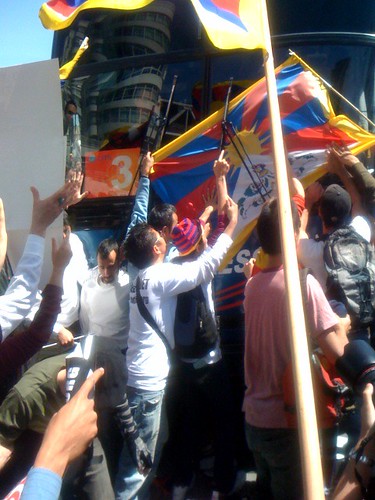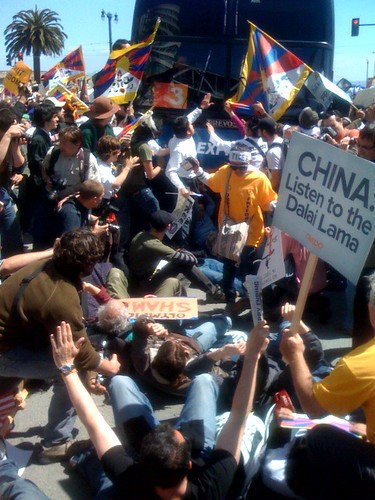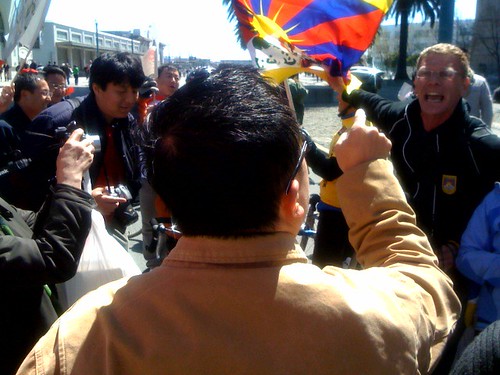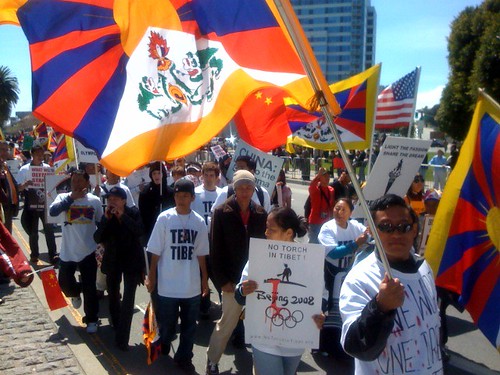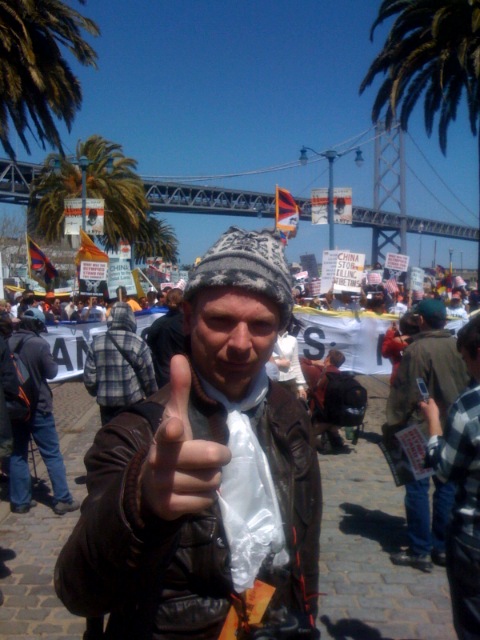(Chris Daly is the George Costanza of SF politics, but his wife kicks ass and I think of him as a friend. I’ll be posting pics of the protest on Calitics as fast ss I can. – promoted by Bob Brigham)
Join me for an historic rally and march on Beijing’s Olympic Torch in solidarity with the people of Tibet.
Wednesday, April 9th, 12 Noon, Embarcadero near Market
Nearly two months ago, representatives from the Tibetan community began working with my office on a resolution for the Board of Supervisors. Tibetans were rightfully concerned that the People’s Republic of China (PRC) was using the Olympic Games in Beijing to gloss over their program of cultural genocide in Tibet. San Francisco would be the only stop in the US for the Torch Relay scheduled to make its way to Tibet this summer. On March 10th, Tibetan Uprising Day, I was set to introduce the resolution.
On the same day 300 brave monks set out from Drepung monastery outside of Lhasa on a protest march to Potala Palace in the heart of the city. The arrest of dozens of these monks led to further protests and uprising on the streets of Lhasa and other cities across Tibet. The Chinese government met these protests with a brutal crackdown, killing over 100 Tibetans and arresting hundreds of others in door-to-door raids.
This wicked turn of events in Tibet catapulted what would otherwise be a highly symbolic resolution into the national and international spotlight — drawing significant attention to San Francisco as we called out China’s abysmal human rights record – a laundry list of dirty abuses that extend from cultural genocide in Tibet to persecution of Falun Gong practitioners, from suppressing labor and environmental activists to stifling freedom of speech and press, and from militarily aiding genocide in Darfur to propping up a brutal dictatorship in Burma.
For months, Gavin Newsom had been working closely with top Chinese government officials on preparations for the torch event in San Francisco. For the PRC, the San Francisco leg of the relay had a unique importance due to our economic role in the Pacific Rim and for our significant Chinese population. For Gavin Newsom, the torch relay was a ready-made opportunity to elevate his national and international political stature.
But the veil of secrecy under which this planning took place became increasingly apparent as the Board’s resolution worked its way through the legislative process. Community groups and reporters alike were asking questions about the route and how protests would be handled. The answers were either not forthcoming (the route was not set) or the wrong ones (protests would be limited to “free speech zones”). Gavin Newsom also started to be asked about his position on human rights in China.
After the brutal crackdown in Tibet, it became increasingly difficult for Newsom to dodge these questions. One of Gavin’s political mentors, Nancy Pelosi, took a strong stance on the PRC’s crackdown, traveling to meet with the Dalai Lama in India. She said, “If freedom loving people throughout the world do not speak out against China’s oppression in China and Tibet, we have lost all moral authority to speak on behalf of human rights anywhere in the world.” Pelosi’s actions challenged Newsom to act with conscience, but instead he opted for the same line used by George Bush — politics, including China’s crackdown in Tibet, should be kept separate from the Beijing Olympics.
But the notion that we can somehow separate politics from an international event on the scale of the Olympics is an impossible one, even if the Olympic Charter wasn’t dedicated to “promoting a peaceful society concerned with the preservation of human dignity.” The Olympic Games have been necessarily intertwined with our politics and history. This was especially the case with ’36 Berlin Games, ’68 Mexico City Games, and the boycott games of ’80 and ’84. While the 1996 Olympic Games in Atlanta had little international controversy, the local politics in Atlanta were very loaded. To make way for the Olympic Village, the oldest public housing development in the country was demolished. Thousands of people lost their homes while new laws were enacted to target homeless people. Meanwhile, the
Fortunately, Newsom ultimately backed down from China’s requests of limiting protest, although you’d think the Mayor of San Francisco would know better. The entire City of San Francisco is and will always be a “free speech zone.” San Francisco is known across the globe for protest, one of free speech’s most critical elements; from the General Strike in 1934 to the hundreds of thousands that flooded San Francisco streets to protest the invasion of Iraq in 2003. So when the Board of Supervisors resolved that the Olympic Torch should be received with alarm and protest, we did so fully cognizant of the role of protest in our great City.
As the Olympic Torch approaches, it is critical that we acknowledge the situation in Tibet has reached a crisis point and appreciate the gravity of our opportunity to highlight the issue on behalf of those inside Tibet who are being brutally persecuted by the Chinese government for expressing their desire for freedom. We must build on the message that’s been delivered by people of conscience in Athens, London, and now Paris.
Our March on the Torch will continue the peoples’ story of justice — that this torch should not be allowed to go through Tibet. We will apply even more pressure on the International Olympic Committee to end their complicity in China’s brutal crackdown and send a clear signal to the PRC that they need to clean up their human rights record and end their brutality in Tibet at once.
The cause of international human rights is coming to San Francisco on Wednesday. Please march with us to accept this enormous responsibility.
For up to the minute updates please text SFTORCH to 41411.

